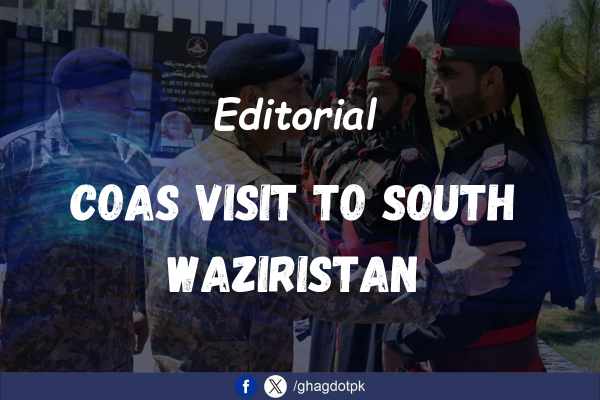The Chief of the Army Staff, General Syed Asim Munir, paid a significant visit to South Waziristan on Tuesday. While there, he spoke with young people and high-ranking military officers and took a briefing from Corps Commander Peshawar Lt. Gen. Omar Bukhari on the security situation in the area. The corps commander and other officials greeted the army chief upon his arrival at Wana, the district headquarters of South Waziristan, and laid wreaths at the memorial to honor the security forces’ sacrifices for the restoration of peace.
According to the army chief, the people of Khyber Pakhtunkhwa, particularly the tribal areas, and the security forces have made heroic sacrifices for Pakistan’s stability and establishment of peace. We acknowledge their contribution and promise them that their sacrifices will not be in vain and that peace will be upheld at all costs. Instead, it will also make the process of facilitating the growth and prosperity of the area feasible.
The ISPR released a statement stating that the army chief stated in his speech that all forces are pursuing the same strategy of working together to eradicate terrorism and that the Pakistan Army is concentrating on offering the Khyber Pakhtunkhwa police additional facilities in addition to technical help.
It is encouraging to see that, in contrast to the federal and provincial authorities, the Pakistan Army’s leadership is giving unprecedented attention to the problems facing Khyber Pakhtunkhwa, particularly the tribal areas affected by the insurgency. Since assuming the office, Army Chief General Syed Asim Munir has made an unprecedented number of visits to the affected areas. It is appreciated that he also recognizes the contributions and sacrifices made by the people of Khyber Pakhtunkhwa on every occasion.
The day the Chief of Army was visiting Wanna The same day, tensions returned to another tribal area in Kurram district, with reports of multiple fatalities. In North Waziristan, the Pakistani Army was taking part in a significant operation. The unfortunate aspect of the whole scenario is that it appears the PTI provincial government is not taking the necessary steps to bring about peace. Instead, even under these dire conditions, this government was using the assembly session as a political football match against the state institutions. All parties involved must align and begin collaborative efforts while acknowledging the persistent obstacle.






